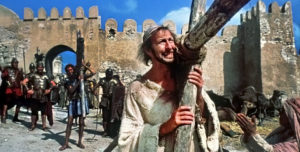In a cemetery near the fishing village of Mousehole, in Cornwall, stands a memorial stone to Dolly Pentreath. Erected in 1860, it commemorates her death in 1777: already, by then, the last known native speaker of the Cornish language.
What would it be like to watch your language die over your lifetime? A language encodes a way of looking at the world, as much as of interacting with others. The many Inuit words for “snow” may or may not be apocryphal, but the legend captures something true: a language goes into great detail on subjects its speakers believe important. What would it be like to be the only one left for whom these words, those sentences, felt natural and obvious?
In a similar way, a religious faith is a moral language. A faith goes into great detail on themes its speakers believe important. Moral languages can also die, or evolve into something new, as (for whatever reason) its adherents stop passing on its grammar and priorities.
These gloomy thoughts percolated last Sunday as I sat, with my daughter on my lap, gazing around the 800-year-old nave of a little Norman church near our home, as we listened to the Palm Sunday reading of the Passion of Christ. This story is the heart of the Christian faith: it describes an incarnate God, acclaimed in his own capital city as Messiah — and betrayed in the moment of worldly triumph. It tells of that deity swarmed by a mocking crowd, and abandoned by even the disciples who swore never to do so. It recounts his death on the cross, as a criminal flanked by criminals, crying out at the last moment of agony about having been forsaken by the God in whom he trusted.
Today, we view the cross through a 2,000-year prism of Christian meanings. In the pre-Christian tradition absorbed into that symbolism, though, it was often held to symbolise the four material elements of earth, air, fire, and water. And from this perspective, we might read the Crucifixion as in part the story of a God that doesn’t just willingly take on flesh, but also the profound suffering that comes with embodied life: limitation, pain, and — finally — agonising death, in the certainty of having been forsaken by the divine.
And in this sense, the two-millennia trajectory of the Christian Church also echoes the Passion narrative. A faith born among the poor, rising to immense worldly reach and power; even in that little church, one of thousands throughout England, gravestones and memorials mark more than 800 years of the great and the good whose lives pepper this story. Then, the same institution, crippled from within at the moment of peak political reach, and now spiralling toward irrelevance.
The Passion, and the Holy Week in which it’s celebrated, is the central festival in the Christian liturgical calendar. Not so long ago, whole communities would have turned out to celebrate it. Last weekend, though, nearly all of the thin congregation was over 60. What will happen to that unbroken fabric of cultural continuity when people stop showing up? Will my daughter, like Dolly Pentreath, see her native moral grammar and way of looking at the world fade and disappear?
But it makes sense that we should have arrived here. For the history of the Christian Church is also the long history of its slow death on the cross of matter. We can’t separate the history of Christianity from that of scientific modernity — which is to say, from our trajectory away from enchantment, and into the material world. It was movable type and the proliferation of Bibles, then the spread of literacy and thereafter the break with papal authority, that opened space for the first stirrings of modern natural science. With that science came the steady withdrawal of God from His creation, first (per Descartes) into mechanistic principles, and finally (per Nietzsche) from widespread observance altogether: killed by our own hand. In the space left by our murder of God, Nietzsche claims, we may now attempt to create our own values and, if we can, to live by them.
These shifts have consequences that reach far wider than individual ruminations, or small provincial churches. For as God has given way to (or been sacrificed for) science, so money and congregants have drained away, and moral authority has departed with them. Today, opponents howl about “Christian privilege”, but the reality is that the inverse operates. Where the Christian moral grammar once formed the common structure within which other religious outlooks were more or less tolerated, Christians are now a minority within a framework that has adopted some of its ideas, but is overtly hostile to many of the beliefs.
At the heart of this is a thoroughly Christian battle: one that could only happen from within a faith that speaks of how “the Word became flesh”. Christianity describes a God who took on mortal, embodied life; an extraordinary image that triggered a 2,000-year effort to square the sometimes-competing claims of matter and spirit. Accordingly, schisms often also turn on disagreements over that relation, and have often carried real-world consequences.
The relative import of spirit and matter was at the heart of wranglings between Catholic and Protestant factions after the English Civil War, for example. Do good deeds in this world affect our prospect of Heaven in the next? Does the Eucharist become literally the Body and Blood of Christ? These may seem abstruse arguments to a modern-day reader, but 17th-century England considered them so important that the Test Act of 1673 forced anyone entering public office to renounce the doctrine of works, and of literal transubstantiation.
And today, something akin to the Test Acts is once again emerging. Once again, too, the dispute is over the relation between Word and Flesh — but this time the domain is not the world, or the Eucharist, but our bodies themselves. Are we created in God’s image, and what does that mean if so? Are we obliged to remain the sex we’re born as? Is it permissible to end a pregnancy? Are any desires forbidden, and why? Who gets to marry? What is marriage even for?
On all these points, the long-held Christian moral grammar departs from now-prevailing norms. And on all these points, Christians are permitted to exist in public life to the extent that they’re willing to forswear doctrine, or at the very least to keep quiet about their beliefs. A recent case in point is SNP politician Kate Forbes, whose candidacy as Scotland’s First Minister was effectively halted by views on abortion, marriage and gender ideology that remain standard Christian teaching across many denominations, but are now widely viewed as irrationally “faith-based”, troubling, outdated and rendering those who profess them unfit for public office.
Last Sunday, gazing at the cobwebbed relics of that Church at the peak of its power, I listened to the superannuated congregation read the description of Christ’s death on Calvary: three hours of darkness, in the middle of the day, at the end of which the incarnate God cried out: “My God, my God, why hast thou forsaken me?”. And it struck me that, inasmuch as the Passion holds, too, for the Christian church, that worldly story is also now well into the hours of darkness.
Perhaps we’re already forsaken. Far more eminent thinkers than I have already declared God’s disappearance — and not just enemies of the Christian faith, such as Nietzsche. Others whose work is intricately bound up in Christian tradition, such as the philosopher Alasdair Macintyre, critique the extent to which modernity has produced a string of hollow efforts to ground a workable morality, on principles from which the divine telos (aim) has been excised.
In these institutional hours of darkness, too, we’re left only with the four elements of matter: the domain of the rational, the tangible, and the measurable. Meanwhile, the new Test Acts — the doctrinal vows that Kate Forbes refused to take, even at the cost of her SNP leadership bid — affirm that where human bodies are concerned, it’s not just frowned-upon to treat matter as having any relationship with divinity.
Now, it’s outright heresy. There is no such thing as a divine plan, or a telos for the human organism. Instead, what makes us “human” is our freedom to self-create, in any form we like, and our bodies have moral valence only inasmuch we choose to sanctify them. To put it another way: Christianity’s successor-faith — a faith now hard at work suppressing its progenitor — treats as sacrosanct the moment God left His son alone, on the cross of matter.
To suggest that anyone might be called to any purpose other than the one they themselves have chosen is to be guilty of a kind of moral violence. And the new Test Act obliges us to accept that the price of political power is professing to renounce such moral violence, and to believe that Word and Flesh are utterly separate, and there is no Word save the one we ourselves choose.
Those who still adhere to the old grammar have responded to the new Test Acts in a number of ways. One is simply to accept the new moral regime. Another is to rage against the crumbling of the old order, or to call for a renewed, more muscular political Christianity capable of fighting back. Elsewhere, again, others propose in various ways returning to the catacombs: the “Benedict Option”, as Rod Dreher called it, or, in Paul Kingsnorth’s formulation, fleeing to the wilderness for a contemplative approach to re-enchanting the world. In all these proposals, one bleak common theme recurs: despair. “My God, my God, why hast thou forsaken me?”
During Holy Week, even so, many Christians still show up, whether in church or in their thoughts, to meditate on the Passion and on the three days that followed it, during which the tomb remained sealed and guarded. And perhaps we need to extend that meditation as well to the bigger story of the Christian Church. For Nietzsche was right: we have indeed killed God. But what he left out, in his gleeful embrace of nihilism, is the rest of the story of God’s death.
The Word may have journeyed into Flesh, and thence into mortification, despair, and finally death, in the certainty of God’s abandonment. We may have joined Nietzsche in effecting this death and abandonment, before collectively bemoaning the slow death of the institutions that embodied the Christian God on Earth. In their place, and over their backs, we live under a newly-ascendant post-Christian moral regime, that sanctifies God’s abandonment of His creation and bans those who dissent from political office.
But let Nietzsche have his victory. I don’t know how long these three metaphorical days of mourning will last; but the other message of the Passion is that this, of all times, is the moment for faith. This story has long been retold not just as history, but also as prophecy. And seen thus, the Passion’s deepest mystery is yet to come.
For on the third day, the disciples found the stone rolled away. And from behind it, Word and Flesh returned: once again living, and once again united.
Disclaimer
Some of the posts we share are controversial and we do not necessarily agree with them in the whole extend. Sometimes we agree with the content or part of it but we do not agree with the narration or language. Nevertheless we find them somehow interesting, valuable and/or informative or we share them, because we strongly believe in freedom of speech, free press and journalism. We strongly encourage you to have a critical approach to all the content, do your own research and analysis to build your own opinion.
We would be glad to have your feedback.
Source: UnHerd Read the original article here: https://unherd.com/







